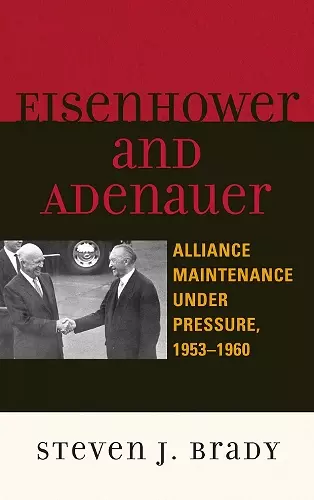Eisenhower and Adenauer
Alliance Maintenance under Pressure, 1953–1960
Format:Hardback
Publisher:Lexington Books
Published:25th Nov '09
Currently unavailable, and unfortunately no date known when it will be back

In the early years of the Atlantic Alliance, no bilateral relationship was more important than that between the Federal Republic of Germany and the United States. Even so, the West German-American alliance was taxing for both sides during much of the first two decades of the Cold War. Ultimately, despite frequent, significant challenges to the alliance from without and within, the two allies managed to achieve a positive and productive relationship - Eisenhower and Adenauer explains how they did so. In both capitals, the top foreign policy makers were deeply involved in the conduct of what they viewed as a vital bilateral alliance, with both President Dwight Eisenhower and Chancellor Konrad Adenauer taking the lead in his own government. For the Americans, a rearmed FRG tightly bound to the West was the bedrock of any European security policy that could contain the Soviet Union for the long-term. For the West German government, their relationship with the United States was the bedrock of rehabilitation and, indeed, survival as an independent country. In this book, their alliance is closely analyzed to form new knowledge on the West German-American relationship during the Cold War.
Two decades ago, when the Berlin Wall fell, it was clear the Cold War was over, and that the American relationship with the Federal Republic of Germany was central to the outcome of the struggle. However, historians have been negligent in understanding the creation and nurturing of that alliance between former enemies. Steven Brady's Eisenhower and Adenauer is a welcome corrective, a sophisticated, well-written, and careful study of the crucial formative years of the US-German partnership. Brady rejects the "golden age" nostalgia and demonstrates the significant differences and misunderstandings which had to be faced before these two countries could cooperate effectively. He restores the crucial role played by leaders like Dwight Eisenhower, John Foster Dulles and Konrad Adenauer in overcoming the past, and provides an important lesson for today's leaders in dealing with the challenges of multilateral diplomacy and alliance management. Brady's book is essential reading for understanding this period in the international history of the Cold War. -- Thomas A. Schwartz, Vanderbilt University
In this dutiful diplomatic history, Steven J. Brady argues that understanding the U.S.-West German relationship during the 1950s helps to explain why the Cold War last as long as it did....With this book, Brady offers a solid contribution to an already large literature on alliance politics-about both sides of the Iron Curtain- that suggests such politics played a vital role in prolonging the stalemate between the superpowers. * The Journal Of Central European History *
ISBN: 9780739142257
Dimensions: 240mm x 162mm x 24mm
Weight: 599g
290 pages